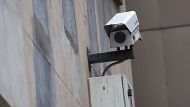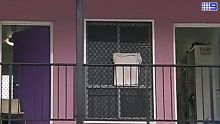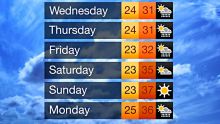The mayor of one of Australia's largest councils is refusing to back down amid a storm of controversy over listening devices installed on CCTV cameras.
The moves, believed to be a first in Australia, have been compared to George Orwell's Big Brother amid concerns from the Queensland Law Society and the Privacy Commissioner that it could be illegal.
More QLD News Videos
Sound recordings on CCTV
Moreton Bay Regional Council starts recording audio with its network of CCTV cameras, prompting fears over breach of privacy.
The public stoush, which escalated when commissioner Phil Green rejected claims his office had approved the rollout, sparked calls for a public debate about privacy.
On Monday, Moreton Bay Regional Council, sitting just to the north of Brisbane, switched on listening devices attached to more than 330 of its 874 CCTV cameras.

The move was hailed as a way to help police but was quickly criticised as an invasion of privacy.
Mayor Allan Sutherland defended the new surveillance technology on Wednesday, saying it would help fight crime and protect ratepayers.
He said the council had sought legal advice before installing the listening capability and would not back down unless there was a legislation change.
"We're losing the point here. The point here is that we're out here to protect the citizens of Moreton Bay," he told ABC Radio Brisbane.
"… We haven't got people sitting in an office, eavesdropping on conversations.
"They're blank screens, they're set up where they're watching the video of places like, let's say Settlement Cove and if there's you know, a baddy, a creepy sort of a character that's talking and liaising with someone else and the police request that file because they think he's a paedophile and he's hanging around those areas, we pass it on and police access the audio."
Queensland Law Society spokesman and immediate past president Bill Potts said the rollout appeared to breach the Invasion of Privacy Act's restrictions on recording a private conversation.
"There are all sorts of private conversations, where people would expect their conversations would not be listened to, would not be potentially made public," he said.
"And since when in Queensland have we allowed our state to listen to its citizens, with no debate, with no real explanation that stands up to this sort of thing."
Mr Potts, who has compared the scheme to Big Brother, called on the Police Commissioner, Police Minister and Attorney-General to state whether they supported the added surveillance.
Cr Sutherland defended accusations of a lack of consultation, saying a draft press release was sent to the Office of the Information Commissioner, which raised "no concerns".
Mr Green's office was originally reported to have endorsed or approved the scheme but he stressed that was not the case.
"I do have some concerns beyond our own legislation, not just the Information Privacy Act but the Invasion of Privacy legislation that's administered by the Attorney-General and the Queensland Police," he said.
"That (scheme) seems to fall foul of that possibly as well.
"So I think the council will have to seek some legal advice and work with us. It's possible their planned use of that body of recording equipment isn't lawful."
Mr Green said he wasn't aware of such moves anywhere else in the country but warned other councils and private businesses would likely follow suit.
He called for a public debate into what level of surveillance Queenslanders were comfortable with.
Lord Mayor Graham Quirk, from the neighbouring Brisbane City Council, said his council's extensive CCTV network, which numbered 126 in the CBD and Fortitude Valley, did not record audio.
"We certainly don't have any plans on the table at this time to do that," he said.
"What we have done, obviously, is to use CCTV cameras in the CBD and the Valley in particular, where we've been able to create intervention arrangements.
"When we see an incident happening, we have amplification systems that can intervene, but also quick response linked to police iPads.
"But we have never gone down the track of audio and, at this stage, it's not our intention to."
When asked whether it was appropriate for a council to covertly record citizens' private conversations, Cr Quirk said: "Look, I don't want to go down that track at the moment."
"I know Moreton have introduced it and I know there's been some debate around that, but at this stage all I can say to you is that we in council, here in Brisbane, haven't considered it," he said.
"It's not in our plans to consider it at this time."
President of the Queensland Council for Civil Liberties Michael Cope said the recording devices would not act as a deterrent for crime.
"CCTV is a cheap way for politicians to be seen to be doing something to reduce crime. But it creates a false sense of security for the public," he said.
"Whilst we accept there is evidence that CCTV helps in the prosecution of crime, in the council's view there is no evidence to support the proposition that the use of CCTV deters crime."
He said the Council for Civil Liberties was also concerned about how sensitive the microphones are, and people should be warned their conversations may be recorded.
"If this is to proceed then the sound recordings should be kept for no more than say 48 hours, unless they are tagged as needed in relation to a particular incident," Mr Cope said.
"And signs should be erected warning people that if they are in a certain area their conversations may be recorded."
Mr Green has asked the council for more information about its plans.
- with Rachel Clun and Cameron Atfield













